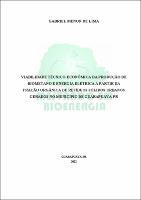| Compartilhamento |


|
Use este identificador para citar ou linkar para este item:
http://tede.unicentro.br:8080/jspui/handle/jspui/2138| Tipo do documento: | Dissertação |
| Título: | VIABILIDADE TÉCNICO-ECONÔMICA DA PRODUÇÃO DE BIOMETANO E ENERGIA ELÉTRICA A PARTIR DA FRAÇÃO ORGÂNICA DE RESÍDUOS SÓLIDOS URBANOS GERADOS NO MUNICÍPIO DE GUARAPUAVA-PR |
| Título(s) alternativo(s): | Technical-economic feasibility of producing biomethane and electricity from the organic fraction of municipal solid waste in the Guarapuava-PR county |
| Autor: | LIMA, GABRIEL MENON DE  |
| Primeiro orientador: | Schirmer, Waldir Nagel |
| Resumo: | A digestão anaeróbica da fração orgânica de resíduos sólidos urbanos (RSU) é uma importante tecnologia para a produção de energia, corroborando com o aumento da vida útil do aterro e a redução da emissão de gases de efeito estufa (GEEs) do setor de gerenciamento de resíduos. Neste contexto, estudos sobre os aspectos econômicos podem auxiliar a tomada de decisões sobre investimentos em empreendimentos de valorização de energia dessas plantas. Assim, este trabalho teve como objetivo analisar a viabilidade econômica de dois projetos hipotéticos de produção de energia através da digestão anaeróbica da fração orgânica de resíduos sólidos urbanos (FORSU) no aterro sanitário do município de Guarapuava, Estado do Paraná: o primeiro projeto (P1) visando à produção de biometano para comercialização; e o segundo projeto (P2) visando à produção de biometano para conversão em energia elétrica. Para tanto, foram calculadas a quantidade de biometano e a potência elétrica disponível a partir de estimativas da quantidade de RSU destinados ao aterro sanitário entre 2023 e 2042. Foram ainda estimados os custos de instalação, operação e manutenção da planta nos dois projetos, e calculado o faturamento visando à venda de biometano, créditos de descarbonização (CBIOs), energia elétrica, materiais recicláveis e à prestação de serviços sobre a disposição final de RSU no aterro sanitário. Através do cálculo do valor presente líquido (VPL), concluiu-se que não há viabilidade econômica para a implantação dos projetos P1 e P2. A análise de sensibilidade do VPL foi realizada considerando a redução do conjunto dos maiores investimentos e custos dos projetos, constatando-se que a viabilidade econômica dos empreendimentos fica vinculada à redução igual ou superior a 70% e 80% desses gastos em P1 e P2, respectivamente. Os resultados evidenciam a necessidade do desenvolvimento de políticas e incentivos econômicos mais congruentes para a utilização da rota tecnológica de digestão anaeróbica para geração de energia em aterros sanitários em municípios com características populacionais semelhantes à Guarapuava. |
| Abstract: | The anaerobic digestion of the organic fraction of municipal solid waste (MSW) is an important technology for energy production, corroborating the increase in the useful life of the landfill and the reduction of greenhouse gases (GHG) emissions in the waste management sector. In this context, studies on the economic aspects can help decision making about investments in energy recovery projects of these plants. Thus, this work aimed to analyze the economic viability of two hypothetical projects of energy production through anaerobic digestion of the organic fraction of municipal solid waste (OFMSW) in the sanitary landfill of Guarapuava county, Paraná State: the first project (P1) aimed at the production of biomethane for commercialization; and the second project (P2) aimed at producing biomethane for conversion into electrical energy. To this end, the amount of biomethane and the electrical power available were calculated from estimates of the amount of MSW destined for the sanitary landfill between 2023 and 2042. It was still estimated the costs of installation, operation and maintenance of the plant in the two projects, and the billing was calculated for selling biomethane, decarbonization credits (CBIOs), electricity, recyclable materials and the provision of services on the final disposal of MSW in the sanitary landfill. Through the calculation of the net present value (NPV), it was concluded that there is no economic feasibility for the implementation of P1 and P2 projects. The NPV sensitivity analysis was carried out considering the reduction of the highest investments and costs group of the projects, noting that the economic viability of the projects is linked to a equal or greater reduction than 70% and 80% of these expenses in P1 and P2, respectively. The results show the needing to develop more consistent policies and economic incentives for the use of the anaerobic digestion technological route to generate energy in sanitary landfills in municipalities with population characteristics similar to Guarapuava. |
| Palavras-chave: | Análise econômica Aterro sanitário Bioenergia Digestão anaeróbica Valorização de resíduos sólidos Anaerobic digestion Bioenergy Economic analysis Sanitary landfill Solid waste valorization |
| Área(s) do CNPq: | CIENCIAS EXATAS E DA TERRA::QUIMICA ENGENHARIAS CIENCIAS BIOLOGICAS CIENCIAS SOCIAIS APLICADAS::ADMINISTRACAO |
| Idioma: | por |
| País: | Brasil |
| Instituição: | Universidade Estadual do Centro-Oeste |
| Sigla da instituição: | UNICENTRO |
| Departamento: | Unicentro::Departamento de Ciências Agrárias e Ambientais |
| Programa: | Programa de Pós-Graduação em Bioenergia (Mestrado) |
| Citação: | LIMA, GABRIEL MENON DE. VIABILIDADE TÉCNICO-ECONÔMICA DA PRODUÇÃO DE BIOMETANO E ENERGIA ELÉTRICA A PARTIR DA FRAÇÃO ORGÂNICA DE RESÍDUOS SÓLIDOS URBANOS GERADOS NO MUNICÍPIO DE GUARAPUAVA-PR. 2022. 84 f. Dissertação (Programa de Pós-Graduação em Bioenergia - Mestrado) - Universidade Estadual do Centro-Oeste, Guarapuava. |
| Tipo de acesso: | Acesso Aberto |
| URI: | http://tede.unicentro.br:8080/jspui/handle/jspui/2138 |
| Data de defesa: | 30-Set-2022 |
| Aparece nas coleções: | Programa de Pós-Graduação em Bioenergia |
Arquivos associados a este item:
| Arquivo | Descrição | Tamanho | Formato | |
|---|---|---|---|---|
| Dissertação - Gabriel Menon.pdf | Dissertação - Gabriel Menon | 1,17 MB | Adobe PDF |  Baixar/Abrir Pré-Visualizar |
Os itens no repositório estão protegidos por copyright, com todos os direitos reservados, salvo quando é indicado o contrário.




